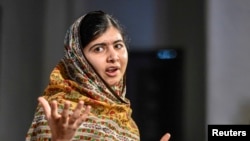An association of privately run Pakistani schools has staged what it billed as “I Am Not Malala” day to protest against education activist and Nobel Peace Prize laureate Malala Yousafzai.
Calling Yousafzai's book "I Am Malala" "the most controversial issue,” Mirza Kashif Ali, the head of the All Pakistan Private Schools Federation, helped organize protests Monday in the alliance's schools.
“In the book there are a lot of things that are controversial. Not only controversial, rather, purely against Islam, is purely against the constitution of Pakistan and is purely against the ideology of Pakistan,” Ali told Voice of America Deewa in an interview.
Ali has argued that Malala was "playing into the hands of the West." The accusation echoes the complaint of many culturally conservative and Islamist forces in Pakistan, who routinely dismiss support for women's rights as a Western-backed effort to undermine Pakistani and Islamic mores.
Rushdie book
In a statement to media Monday, the private school federation chief singled out a reference Malala makes in her book to Salman Rushdie, author of "The Satanic Verses," a novel banned in Pakistan as blasphemous. Malala wrote that, at the time of the book's publication, her father considered the issue a matter of freedom of expression and said he favored a "rational" response to the book over street protests. This, argued Ali, showed that Malala was in a "nexus" with Rushdie.
Ali also took exception to the fact that Malala wrote of "God" rather than "Allah" and said she did not pay sufficient respect when referring to the Prophet Muhammad, ignoring a practice common in writing for Islamic readers but not so to a wider audience.
"I Am Malala" has been banned from schools that are members of Ali’s federation, which he claims represents more than 150,000 private schools.
The young activist, now 17, rose to prominence after being shot in the head by Pakistani Taliban in 2012 for advocating female education and women's rights in Swat, a scenic valley where the Taliban held sway. She has since lived in Britain, where she received medical assistance and an outpouring of international sympathy and support.
Women's rights activist Gulalai Ismail, like Malala an ethnic Pashtun from the militancy-hit northwestern Khyber Pakhtunkhwa province, rejected suggestions that Malala propagates Western ideas. “In her book, Malala has not spoken of Western thinking,” Ismail, head of the female education advocacy group Aware Girls, said in an interview with Deewa. “She has spoken of the situation in her village. She has spoken of her country. She has spoken of her life.”
Praise from Merkel
On Tuesday, Malala received more international accolades. “A courageous girl like Malala Yousafzai is the identity of Pakistan,” German Chancellor Angela Merkel said during in a joint news conference with Pakistani Prime Minister Nawaz Sharif in Berlin.
While evading a question regarding negative views of Malala in Pakistan, the Pakistani leader was quoted by Reuters as saying, "I think Malala has done a great service for Pakistan.”
After being awarded the Nobel Peace Prize last month, an honor she shared with Indian child rights activist Kailash Satyarthi, Malala vowed to press on with her cause globally, promising to help build a school in the Palestinian territory Gaza. She has also traveled to Nigeria, where she called for efforts to secure the release of hundreds of schoolgirls abducted by Boko Haram Islamist militants.
School federation chief Ali argued that his group initially supported Malala, holding rallies in solidarity after she was attacked by Taliban, but the book had changed the group's position.
Speaking of his group's banning of her book, he argued no book can be in their schools' libraries that is “contrary to Islam and ideology of the country.”
Asked if he could name any other book that had been banned from their schools on the same grounds, Ali said there had been none.
He added that his group planned on holding an "I Am Not Malala" day every year from now on.




